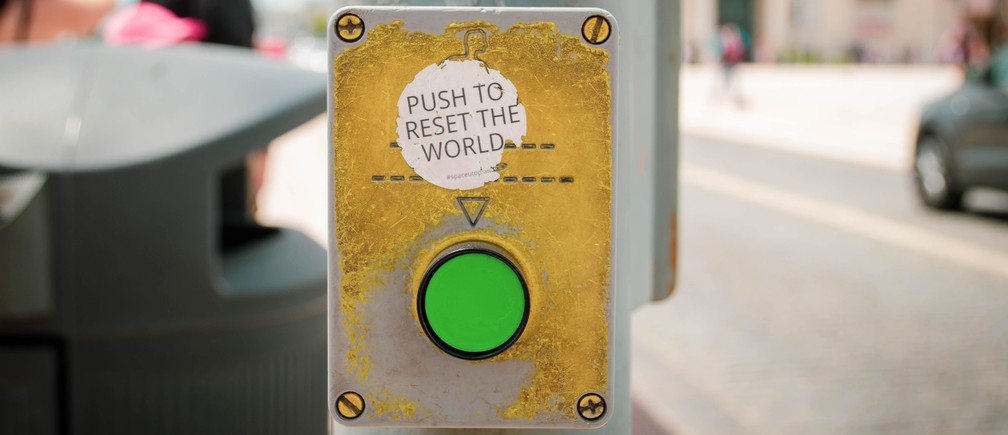The Great Reset: How Did a Corporate Boondoggle Become a Conspiracy Theory?
Mon 10:33 am +01:00, 4 Jan 2021
Writing for UnHerd, Gavin Haynes takes a look at “The Great Reset”, the title of both a tedious seminar hosted by the World Economic Forum in June and of a metastasising conspiracy theory.
In June of this year, the World Economic Forum hosted a video seminar called The Great Reset, to promote a book, also called The Great Reset. It was a crushingly tedious time for all concerned. Bookended with the mitherings of Prince Charles, the event mainly involved a panel of worthies, who all had that NGO tan that comes from endlessly staring at discussion documents about third world poverty from a luxurious Alpine apartment, sharing their thoughts on “sustainability”, “green jobs” and “the global south”.
Their Great Reset, as unveiled in their seminar, proposes a generational shifting of the track-lines of our economic development. It calls for de-carbonising, with the help of massive government stimulus; it wants an internationalist approach that clamps down on tax-dodging companies, paid for by new taxes on the wealthy. Lame, perhaps. But on the face of it, hardly sinister.
The stronger thesis of The Great Reset was best stated by the former Vatican ambassador to the US, Archbishop Carlo Vagano, who in November of this year wrote an open letter to President Trump: “Mr. President, I imagine that you are already aware that in some countries the Great Reset will be activated between the end of this year and the first trimester of 2021. For this purpose, further lockdowns are planned, which will be officially justified by a supposed second and third wave of the pandemic. You are well aware of the means that have been deployed to sow panic and legitimize draconian limitations on individual liberties, artfully provoking a world-wide economic crisis. In the intentions of its architects, this crisis will serve to make the recourse of nations to the Great Reset irreversible, thereby giving the final blow to a world whose existence and very memory they want to completely cancel.“
This is the Great Reset as it now exists within the conspiracy world: the premise that life as we knew it is being flattened so as to be re-forged into the bugman’s paradise – with special emphasis on COVID-19 being essentially fake, or at least wildly overstated.
Clearly, these two Great Resets – the lame version and the conspiracy version – are very different propositions. Yet there is also a sense in which they talk to each other, feed off each other. Above all, each provides an excellent strawman for the opposing team to attack.
The Great Reset, says Haynes, was just too good a phrase not to be taken up by conspiracy theorists.
Of course, Klaus Schwab’s annual talking shop is hardly the only organisation vying to turn the crisis towards their agenda. The problem, it seems, was that they were only supposed to blow the bloody doors off; the title was just too good, too on-the-nose, to be ignored. The Great Reset was accidental over-sell, but only in the way that lighting striking the highest conductive point is “accidental”. By November, when the phrase really took off, societal disquiet was already rumbling, looking for an obvious point-of-contact with reality. Suddenly, a vague unease had a name.
But at the same time, both sides also refuse to concede that the term has multiple meanings. For the WEF and its allies, any opposition to their policies must therefore come from wackos.
On the other side of the fence, those who deal in the fantasies can deploy their own motte and bailey. They point to the WEF’s actual plan as a safe harbour in reality – a stout Christmas tree of genuine fact, on which they can then hang their madder baubles.
Between them lies the real argument, unloved and untackled. The crisis has already put down several waymarkers towards a world few of us signed up for: from the steamrollering of mom-’n’-pops in favour of Amazon, to the truly cashless society, to credit scores based on your Google history to the oft-floated “vaccine passport”. The bugman is always figurative: a kind of platonic ideal pointing towards the dangers of a technocratic 2020s. To take it literally is always to miss the point.
The WEF case rests precisely on explaining why we won’t end up in that future. But tackling the unease fuelling The Great Reset’s wide spectrum of critics would also mean addressing the sentiment underlying its opposition: that however buttery the buzzwords, human beings are rightly suspicious of those who make abstruse high-level plans for their ‘welfare’. Especially if they’re designed by pointy-heads from Davos with no skin in the game — whether they come bearing a thought, a plan, a scheme, or an outright conspiracy.
Worth reading in full.
Stop Press: Several readers have sent us an article that appeared in Principia Scientific pointing out the discrepancy between official UK Government data about how many people have died of COVID-19 and the data for statutory notifications of infectious diseases (NOIDS) in England and Wales. According to PHE, GPs are supposed to notify the local authority when one of their patients dies of a notifiable disease, yet only 13,844 deaths from COVID-19 have been recorded using this method in England and Wales. According to Principia Sceintific, this “shows beyond any reasonable doubt that the pandemic narrative peddled for the last nine months by politicians (in cahoots with the mainstream media) is gross misrepresentation and exaggeration”.
Not so fast. A bit of sleuthing (emailing some GPs) reveals a couple of reasons why GPs wouldn’t report the death of one of their patients from COVID-19 using this clinical reporting system.
- They aren’t aware a patient of theirs has died of COVID-19 because said patient has been admitted to hospital via A&E.
- All lab results are sent to PHE and a note is then inserted into the patient’s notes indicating that as PHE has already been notified a NOID is not required. A clinician has a legal duty to submit a NOID if they have clinical evidence of a notifiable disease, except if PHE has already been notified.
One GP responded thus:
It’s an extremely antiquated system. Useless in my view and should been abandoned years ago. The only thing you can get from it is trends over long periods, although that makes the massive assumption that reporting behaviour doesn’t change. I haven’t reported any Covid cases. In fact, we’re told we don’t have to. It’s a useless piece of data and should be ignored!
https://lockdownsceptics.org/


